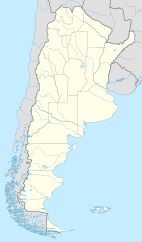Pichanal facts for kids
Quick facts for kids
Pichanal
|
|
|---|---|
|
Municipality and town
|
|
| Country | |
| Province | |
| Founded | April 23, 1912 |
| Elevation | 302 m (991 ft) |
| Population
(2012)
|
|
| • Total | 30,903 |
| ZIP |
4534
|
| Website | Official website: http://www.pichanal.gov.ar/ |
Pichanal is a town and municipality in Orán Department, located in northeastern Salta Province, Argentina. It's an important place because it sits where two major roads meet: National Route 34 and National Route 50. This connection makes it a key spot for trade and travel. Pichanal is also found within the Yungas Biosphere Reserve, a special area known for its unique nature.
Contents
History of Pichanal
Pichanal grew into a town because of the railroad. Before the trains arrived, it was a small area where people met to trade goods.
The Railroad Arrives
On January 4, 1911, a railroad station was built in the area that is now Pichanal. This new station brought a lot of railway activity, including warehouses and camps. Many people from the Chaco de Rivadavia region decided to settle here because of the new opportunities. The very first train pulled into Pichanal on March 4, 1911.
Growth and Development
In October 1911, a railway bridge was finished over the Bermejo River. Three years later, another bridge was completed over the Colorado River. These bridges made Pichanal a very important place for trade and for people to live. The town's population quickly grew as new jobs became available.
First School in Pichanal
In March 1912, the first school in Pichanal was founded. It was named Escuela Coronel Apolinario de Figueroa. Today, this school is very large, with more than 1,000 students. Its current director is Ms. Zunilda Morales of Valencia, and the deputy director is Maria Rodriguez.
Town Celebrations
Every year on April 23, Pichanal celebrates its patron saint festivities. These celebrations honor St. George, the town's patron saint.
Sister Cities
A sister city is a partnership between two cities in different countries. They work together to promote cultural ties and understanding.
See also
 In Spanish: Pichanal para niños
In Spanish: Pichanal para niños
 | John T. Biggers |
 | Thomas Blackshear |
 | Mark Bradford |
 | Beverly Buchanan |


